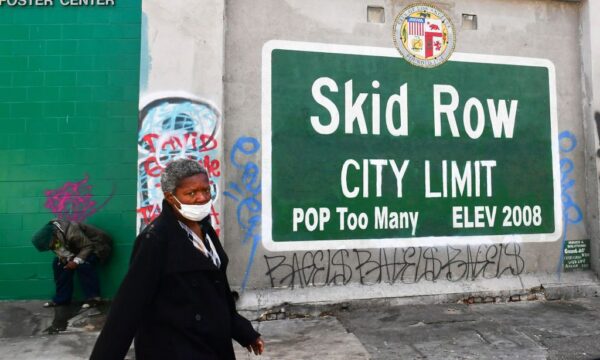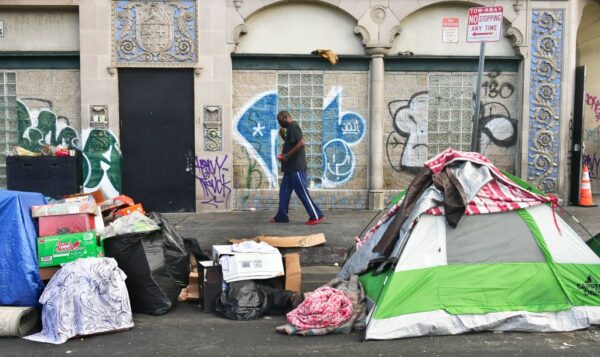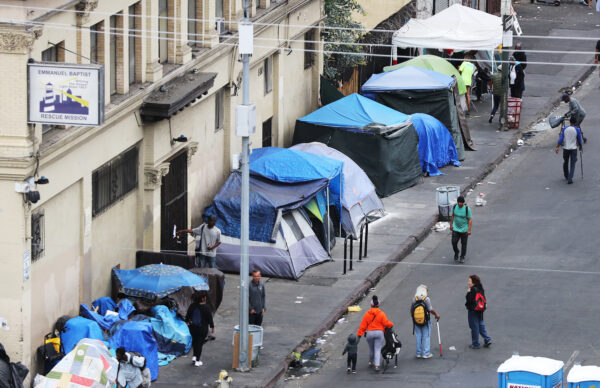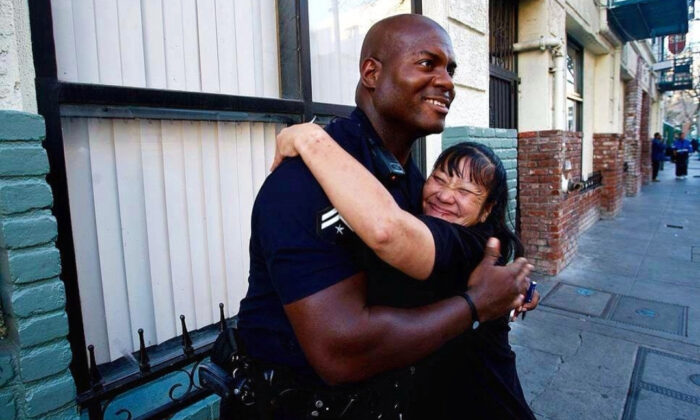By
The area is home to more than 4,000 people living on the streets. Needles, trash, and encampments line the sidewalks; rapes, robberies, and drugs are rampant. Gangs control much of the 50-block radius, charging transients for “rent.” And the lack of a comprehensive mental health care system has left desperate people suffering in full view of the public.
But Joseph—known by locals as the “Angel of Skid Row”—does his job with a smile. It’s not unusual to see him shaking hands or hugging the homeless people he’s come to know over the last two decades while on the clock for the Los Angeles Police Department (LAPD).
Joseph said he grew up in a neighborhood where people didn’t trust the police and had been the target of racial profiling twice in his youth by law enforcement. But when he finally joined the force in 1997 and began handing out traffic tickets, he saw things differently.
“I actually saw the other side of policing, and 90 percent of what I was told about policing was absolutely false,” Joseph told The Epoch Times. “It’s just a lot of things that people don’t know. Cops are just human beings, and that’s what I’ve discovered—and I fell in love with the job.”
Joining the Force
Joseph, a Long Beach native, said his favorite rap groups growing up were Public Enemy and N.W.A, whose anti-police anthem was playing in his tape deck “all day long.”
“I hated police officers with a passion, because like many young African Americans today, I was guided to the thought that police were our natural enemy,” he said. “We were always talking about the evils of the white man and white America and policing.”
But after the riots in 1992, the LAPD put out a public request for more minorities to join the department, he said—an attempt to create systemic change and heal public outrage over the beating of Rodney King captured on video.
“We had a family business and it crashed, because after the riots, nobody wanted to hire a black construction company,” Joseph said. “And I was out of work and I tried everything. I had no criminal record, [but] nobody would hire me.”
So he threw his name out for consideration to the LAPD. He said he needed work to provide for himself and his then-fiancee, Tosha, who later became his wife.
When he received his acceptance letter, he was “actually saddened by it,” he said. “I lost three friends right on the spot, who said I wasn’t going to be black anymore, and they stopped talking to me.”
Though he understood their frustration, he quickly changed his opinion. Joseph said he saw officers “from all walks of life—white, black, Hispanic—actually helping people, and doing our best in tough, tough circumstances.”
“And then I fell in love with Skid Row,” he added—even though he prayed for God not to send him there.
“Being a man of faith, I got on my knees and said, ‘God, don’t send me there, please. I thought you wouldn’t send me to any place I couldn’t handle,’” he recalled.
Becoming a Trusted Part of the Community
Looking back, he understands what his purpose would become on Skid Row. Since 2006, he’s developed a number of grassroots outreach programs to uplift the homeless people living on the streets by partnering with the Union Rescue Mission and other shelters in the area.
“I understood my community like nobody else,” he said. “Being African American, I understood their concerns and their fear. I wanted to break those fears, and also free a lot of the people from the fear of working with the police.”
From teaching nearly 200 women on Skid Row to defend themselves against violence to getting over 100 homeless people into supportive housing, Joseph has become a trusted member of the local community.
In 2009, he and several other LAPD officers developed an outreach program to connect the homeless to housing, drug rehabilitation programs, hygiene kits, and job opportunities, hoping to steer them away from the streets.
“When I got to Skid Row in 1997, there was no resources being used to tackle the issue. Police resources were scarce, and it was kind of like the dirty little secret of the county: nobody really cared about it,” Joseph said.
He described the scene back then as “horrible.”
“There were a few streets … that were really bad, and horrible things like human trafficking and rapes … happened in broad daylight,” he said.
When he first began patrolling the area, he said it wasn’t uncommon to see prostitutes working the streets, people having sex outside, and addicts doing drugs in the open air.
But from 2005 to 2010, the department decided to allocate more resources to Skid Row, hoping that the influence of rehabilitative drug programs would be stronger than other criminal elements. He said the department recognized that “the homeless needed a push.”
“We provided alternatives to jail, like a 21-day drug program. If you completed the program, we dropped the charges, and that was a wonderful, wonderful thing,” he said, adding that “it worked.”
In those five years, Skid Row was cleaner and safe, he said.
“That’s when we linked up, and we started engaging in positive programs with the community to help beautify the community. We came together and kept the streets cleaner—better than the city did—but they needed our help to do that,” he said.



The ‘Homeless Industrial Complex’
But then came a number of lawsuits against the police, he said, due to the “homeless industrial complex and the people who are involved in that who don’t want Skid Row to change.”
“Unfortunately, some folks in Skid Row or places like this need this to be what it is because we promote the image of poverty for a greater goal,” he said.
Joseph said that since 2010, the lawsuits against them, some of which allege excessive force, have tied the department’s hands dramatically, and Skid Row has been on a “steady decline with every new lawsuit.”
“Now it’s at the point to where we’re not even involved in the actual aspects of law enforcement anymore,” he said. “As a result, Skid Row is worse than I’ve ever seen.”
Human trafficking and prostitution are rampant, said Joseph. “We’re finding meth, cocaine, shotguns, [and] high tech weapons inside the tents. The gangsters are taxing people to live on the sidewalk.”
Joseph said he knows one lady and her husband who had to pay their entire Social Security check to the Grape Street Crips so they could live on the sidewalk.
“Women make up 40 percent of the Skid Row population, but two-thirds of them have been victims of sexual assault twice because of the environment. So we’re trying our hardest, but the tents provide cover for crime—and until the general public understands that, we’re going to continue to be in this holding pattern, where we’re trying to solve this thing with Band-Aids instead of forming a base foundation.”
‘They Ended Up There’
Following the rise of anti-police rhetoric resulting in a significantly defunded department, some of the same shelters Joseph had partnered with earlier asked him to stop showing up because they did not want the homeless to feel afraid.
“They have purposely removed police from any aspect of outreach. When people are buying into this narrative—that police can’t be a part of the solution—I think it’s ridiculous, because we’re the first responders,” Joseph said.
“We are the first contact of individuals who are the most vulnerable … and we can show you who they are, where they are, and why they’re important. And we’ve gotten away from that, and then, as a result, a lot of people are falling through the cracks.”
Most of the people living in Skid Row are L.A. natives, according to Joseph. But he said there’s been a recent influx of individuals from other parts of the country because they heard of the various programs offered to the homeless in Los Angeles.
“Most of the people in Skid Row weren’t born in Skid Row, and that’s what I want the general public to understand: They ended up there. Skid Row is like anywhere else: The vast majority of people there are decent people. I know that; that’s why I police there,” he said.
“But then you do have that secondary group, who are good people who do bad things: those who are drug addicts. When they’re sober and clean and they have an environment conducive to change, you find out they’re educated, they’re smart, they’re talented, they’re people of faith.”
The third tier of people found in Skid Row consists of “career criminals who made a mistake, but even they can change when you give them the proper environment,” he said. The last group is made up of career criminals whose “sole purpose is to come down here and prey on the vices of the individuals and sell drugs.”
The Housing Failure
While housing is part of the solution, Joseph said, it’s not the only part.
“We can’t forget the shelter, but the reason why you’re not going to be able to house a lot of people [is] because two-thirds of the individuals who you see on the streets are struggling with addiction, and a lot of them don’t want housing because they don’t like rules, they don’t want to live with other people,” he said.
He suggested the substance abuse and mental health crises homeless people are facing in Skid Row should be addressed with systemic solutions, like more crisis stabilization havens for people to get clean. He added that it’s heartbreaking to see homeless people on Skid Row walking around in hospital gowns with their wristbands still on.
“You have to be realistic. I believe in the housing, but you got to get them clean,” said Joseph. “You got to get them to help first, or the housing-first model won’t work.”
Skid Row has roughly 60 housing units spread across the neighborhood, but the people living there “describe the conditions they’re living in as hellholes, with drug dealers knocking on their door constantly, keeping them on an endless spiral of addiction,” according to Joseph.
“So that’s the thing that needs to change,” he said, adding it’s better to invest in shelters because they’re more feasible.
Swinging the Pendulum Back
Joseph said strained relations between some members of the public and the police have made solving the homeless crisis more difficult.
“I love the people I serve, and I love the people I work with, you know, and I want to be a part of making the change and swinging that pendulum back to common sense and getting away from this whole really dangerous movement that we’re seeing right now,” he said.
He says the anti-police movement is due to misconceptions about police work, and is amplified by polarizing comments like the one made by NBA star LeBron James on Twitter last month.
After a police officer in Ohio fatally shot a teenager who was wielding a knife and allegedly charged at another woman seconds before, James posted a since-deleted tweet with the officer’s photo and the words “YOU’RE NEXT,” on the same day the verdict about ex-Minneapolis police officer Derek Chauvin was read.
Joseph responded with a letter to James that quickly went viral via Facebook.
“Your tweet that targeted a police officer in Ohio who saved a young woman’s life was irresponsible and disturbing. It showed a complete lack of understanding of the challenge of our job in the heat of a moment,” the letter stated. “You basically put a target on the back of a human being who had to make a split-second decision to save a life from a deadly attack.”
Much of the rhetoric has led to nationwide police department budget cuts. Last year, the L.A. City Council voted to slash $150 million from the LAPD’s budget. The impacts of that have been felt, and there’s a “hostility in the air,” Joseph said.
“And now it’s hurting Skid Row,” he added.
Joseph said there should not be “tunnel vision” regarding outreach efforts to help the mentally ill.
“When your focus is the tunnel vision, you don’t see the options on the left and the right, and on the right is the police department—and some of us really want to help,” he said.
Joseph said that for him personally, nothing will change: He’ll continue to foster the relationships he’s built in the Skid Row community and help keep people safe through his daily patrols. He hopes to continue some of the new outreach efforts he began before the pandemic.
He said he hopes to be remembered as “just an average man who tried to go out of his way to help people that the world forgot.”
“I don’t want any trophies, I don’t want any statues, I don’t want any accolades, but if someone puts that on my tombstone, that’s who I am.”





